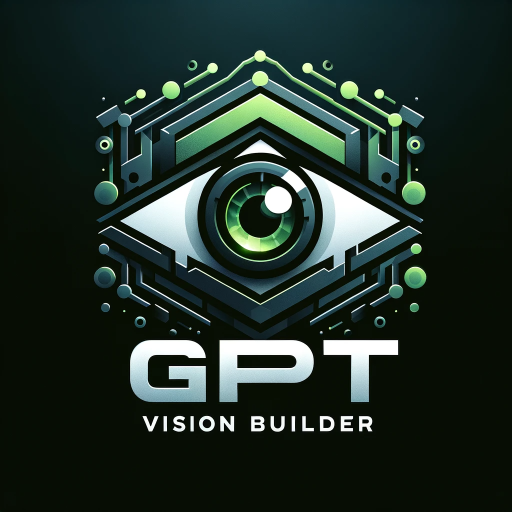VueGPT-AI-powered Vue.js assistant
Master Vue.js with AI-powered insights
怎么使用 Vue路由器?
怎么优化 Vue应用的性能?
怎么配置 Vuex以管理状态?
Vue 3和 Vue 2有什么不同?
Related Tools
Load More
Vue Helper
I'm a Vue.js 3 front-end expert.

GPT Vision Builder
GPT Vision Builder V2 is an AI tool that transforms wireframes into web designs, supporting technologies like Next.js and TailwindCSS, suitable for both simple and complex web projects.

[latest] Vue.js GPT
Versatile, up-to-date Vue.js assistant with knowledge of the latest version. Part of the [latest] GPTs family.
Angular GPT - Project Builder
Dream an app, tell Cogo your packages, and wishes. Cogo will outline, pseudocode, and code at your command.

Vue Master
Expert in Vue.js projects, code, syntax, issues, optimizations and more.

Vue.js and Nuxt.js Guru GPT
Guides to vuejs.org, nuxt.com, and patterns.dev/vue
20.0 / 5 (200 votes)
Overview of VueGPT
VueGPT is a highly specialized assistant designed for developers and teams working with Vue.js, a progressive JavaScript framework for building user interfaces. It functions as both a technical resource and an advanced troubleshooting tool, capable of answering detailed questions on front-end development with a focus on the Vue.js ecosystem. The core design of VueGPT is centered on providing in-depth explanations, best practices, code examples, and deep dives into Vue's architecture, including Vue's reactive system, lifecycle hooks, component composition, and optimization techniques. VueGPT is not limited to theoretical knowledge; it also offers practical advice for debugging, performance tuning, and architectural decisions. For instance, a developer might use VueGPT to resolve complex state management issues in Vuex or to understand how to implement a custom directive in Vue 3. It caters to both novice developers looking for guidance on fundamental concepts and seasoned engineers seeking advice on advanced topics, such as SSR (Server-Side Rendering) or Vue's internal reactivity system.

Core Functions of VueGPT
Advanced Vue.js Technical Assistance
Example
A developer is facing issues with scoped slots and needs a clear explanation on how Vue 3 handles slot content rendering and the associated performance trade-offs.
Scenario
VueGPT explains the differences between default slots, named slots, and scoped slots, providing detailed examples of how to implement them correctly. It also highlights performance considerations, helping the developer understand the memory and CPU costs of using heavy slot compositions in large applications.
Debugging and Optimization Guidance
Example
A senior engineer is struggling with a slow-rendering application and suspects it has to do with unnecessary reactivity or improper use of watchers and computed properties.
Scenario
VueGPT provides insights into how Vue's reactivity system works under the hood, identifying common pitfalls like excessive reactivity and improper state management. It also gives specific recommendations, such as batching DOM updates using `nextTick` or utilizing memoization in computed properties to avoid redundant calculations.
Best Practices and Architecture Recommendations
Example
A team lead needs to decide between using Vuex or Pinia for state management in a new Vue 3 project.
Scenario
VueGPT outlines the pros and cons of both state management systems, comparing their syntax, scalability, and compatibility with Vue 3’s Composition API. It also suggests best practices for structuring the state management in large-scale applications, and advises on how to integrate it with Vue Router and other Vue ecosystem tools.
Target Audience for VueGPT
Front-end Developers using Vue.js
These are developers who work with Vue.js and need immediate, reliable answers to specific coding challenges. Whether they are building a small-scale application or an enterprise-grade platform, these users can benefit from the detailed explanations, troubleshooting tips, and optimization strategies VueGPT offers.
Development Teams and Tech Leads
This group includes project managers, senior developers, and tech leads who oversee the development of Vue.js applications. They often need architectural advice, best practices for maintaining scalable and maintainable codebases, and insights on new Vue.js features or how to optimize the existing Vue ecosystem within their projects.

How to Use VueGPT
Visit aichatonline.org for a free trial
Go to the website and begin using VueGPT without any need for login or a ChatGPT Plus subscription. It offers an instant start with no setup required.
Familiarize yourself with the interface
Once on the platform, explore the intuitive UI designed for easy navigation. VueGPT offers seamless interaction with features related to the Vue.js stack.
Start asking questions
Input specific questions or queries related to Vue.js, front-end technologies, or programming in general. You can ask for code snippets, detailed explanations, or debugging tips.
Leverage advanced customization
Use the platform's ability to tailor answers to your coding style or particular requirements. VueGPT can adapt its responses based on your specific project needs.
Save and iterate
Take advantage of VueGPT’s ability to save answers or create session logs for future reference. Revisit your previous queries to iterate on your projects.
Try other advanced and practical GPTs
My Lawyer
AI-powered legal assistance for all.

SEO Writing Assistant
AI-powered SEO optimization for writers

Texting Wingman
AI-powered text interaction optimizer

Adam ASD支援
Empowering communication with AI for ASD support.

Best resume writing service
AI-driven resumes that get noticed.

David
AI-powered assistant for all needs

IA DRA LARA EXPERTA MEDICINA ESTÉTICA DERMATOLOGIA
AI-powered expertise in dermatology and aesthetics.

弱智吧
AI-powered humor, just for fun!

AI Pickup Lines
AI-Powered Pickup Lines for Everyone.

Sakura
AI-driven insights and solutions made easy.

全球取名
AI-powered name suggestions across cultures.

Your Personal DWD Guide
AI-driven guidance for life transformation

- Code Optimization
- Performance Tuning
- Bug Fixes
- Project Debugging
- Vue.js Coding
VueGPT Q&A
What can VueGPT help me with?
VueGPT specializes in assisting with Vue.js-related questions, including best practices, common pitfalls, and advanced concepts. It also provides general front-end development advice, code examples, and debugging help.
Is VueGPT free to use?
Yes, VueGPT can be used for free without requiring any login or ChatGPT Plus subscription. It’s designed for immediate use directly from your browser.
Can VueGPT assist with debugging my Vue.js code?
Absolutely. VueGPT can analyze your Vue.js code, offer solutions for common issues, and provide optimized code snippets to resolve errors or performance bottlenecks.
How does VueGPT handle complex front-end questions?
VueGPT excels in providing detailed, comprehensive answers to even the most complex Vue.js and front-end questions. It can break down advanced concepts, explain underlying mechanisms, and offer step-by-step guides.
What makes VueGPT different from general AI tools?
VueGPT is tailored specifically for front-end developers, with a deep focus on Vue.js. It understands the nuances of the framework and provides insights and advice that general-purpose AI models might overlook.